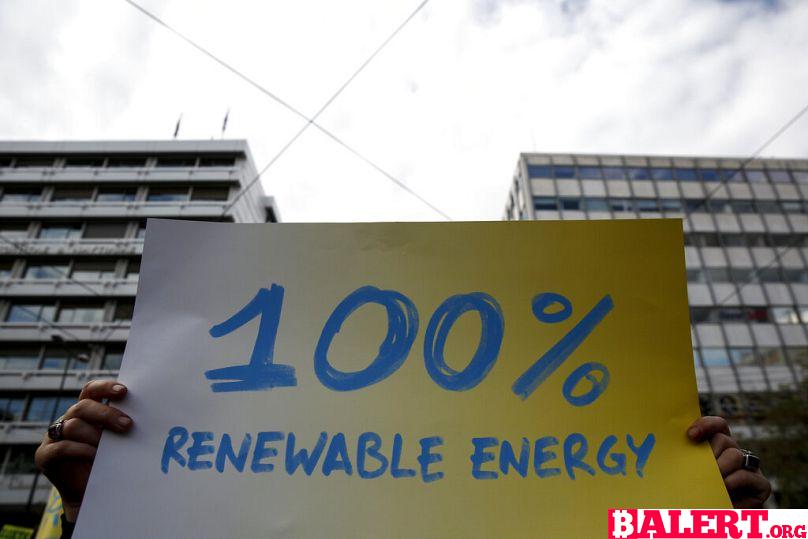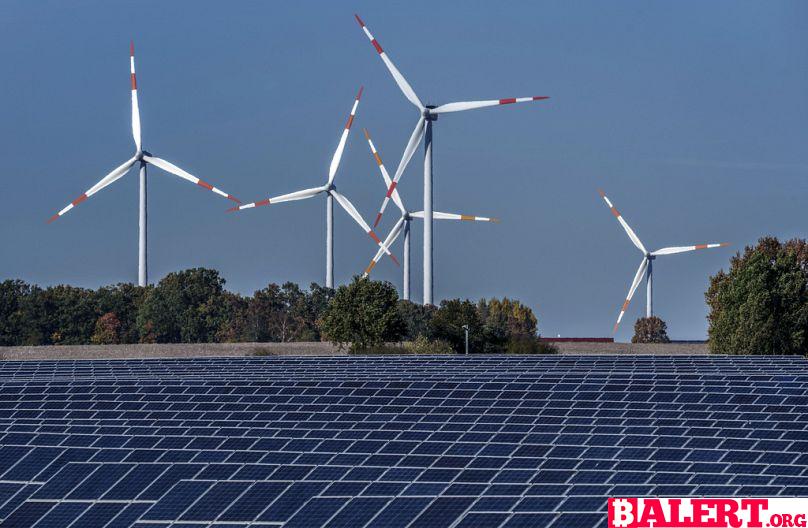World
The Rise of Citizen-Led Renewable Energy Projects in Europe
Discover how citizens in Europe are driving the growth of renewable energy projects, taking charge of sustainable initiatives and shaping the future of clean energy production.

A Spanish cooperative supplier with tens of thousands of members, an Irish cooperative helping citizens renovate their households, a Portuguese cooperative e-car sharing scheme: a tidal wave of citizen-led renewable energy projects is sweeping across Europe. This silent revolution is partly spurred by the recent energy crisis, which pushed millions of households to look for energy independence solutions. This tapestry of inspiring solutions constitutes the lived manifestation of a staggering statistic: by 2050, one in two EU citizens could be producing their own electricity, covering 45% of the EU’s demand.
Increasing concerns about runaway climate change, strong economic returns, and direct democratic participation are just some of the many reasons why EU citizens are turning to energy communities as a solution. Today, REScoop.eu, the European federation of citizen energy cooperatives, has over 2250 members, in turn representing over 2 million EU citizens. However, energy communities are misconstrued as only “small” and “local” with no room in the new economic competitiveness narratives.
A Citizen-Led Re-industrialization
We’re living through consequential times. 2024 is already predicted to be another record-breaking year for global temperatures. Democracy is backsliding across the world, partly due to a newfound wave of economic instability and de-industrialization, leading to an increasing encroachment of the far right into the political mainstream. Policymakers across major economies (US, China, UK) are planning and implementing major publicly-funded renewable re-industrialization agendas. A new world economy is forming: batteries, electric vehicles, and renewables manufacturing are spurring a wave of unprecedented growth even in hitherto sluggish economies.
Albeit with a slow start, the EU is picking up steam with repeated signals that the next European Commission will focus on industrial competitiveness. We must reject the false dichotomy that pits economic revitalization against social and environmental sustainability in this transition. For example, Europe’s industrial push foresees plans such as renewables acceleration areas and net-zero acceleration valleys, which will be used to demarcate the areas where renewable energy projects and industrial clusters can be developed faster.
A Multi-Billion Funding Gap and How to Bridge It

The inclusion of local communities in the planning process and ensuring co-ownership and distribution of benefits could significantly accelerate and simplify the rolling out of renewables, as local opposition would diminish. In its EU Election Manifesto, REScoop.eu calls on policymakers to guarantee meaningful participation and benefits for citizens and local communities in large-scale renewable projects.
With a multi-billion funding gap threatening the EU’s climate goals, a key consideration in the ongoing competitiveness debate is how to scale up funding while ensuring territorial cohesion across the EU. Energy communities can leverage public funds to boost the local economy, providing two to eight times more benefits than private renewable projects.
- Wind turbines turn behind a solar farm in Rapshagen, October 2021
On the one hand, The Net Zero Industry Act has not provided for fresh public funding. Moreover, The European Commission’s high-level report on the future of cohesion policy emphasizes that public EU funding programs will be more effective if they target place-based, people-centered projects that are co-created with local communities. Energy communities can leverage public funds to boost the local economy, providing two to eight times more benefits than private renewable projects.
At the same time, EU citizens and energy communities can mobilize more than €240 billion towards the energy transition by 2030. The much-anticipated Letta report on competitiveness emphasizes that cooperatives must be supported, including through dedicated financing and public procurement, as they play a vital role in the social economy.
Walking the Walk: Examples from the Ground

All across the EU, communities are promoting large-scale renewables and re-industrialization projects:
- In Denmark, local citizens are financing nine 11 MW windmills that will produce 450,000 kWh a year — enough to make the island where they live self-sufficient with power both now and in the future.
- In Belgium, energy cooperatives lobbied the Government to enshrine citizen participation in the first offshore wind tenders. Following this successful campaign, 34 citizen energy cooperatives joined forces in “SeaCoop,” which adopts a visionary “20-20 approach”.
- In recent years, Italy has experienced a notable upsurge in worker buyouts, a trend capable of countering the adverse effects of delocalization while bolstering competitiveness.
Green and inclusive competition will be the make-or-break element for the future of EU cohesion. Energy communities should be acknowledged for the multiple co-benefits they bring to local economies and given an equal footing in this new green industrial boom.
Chris Vrettos is Financing Project Manager at REScoop.eu, Philippe Awouters is Managing Director at SeaCoop, Stephan C Krabsen is Vice President of Energy Communities Denmark, and Luca Varotto is Junior Consultant at Enostra.
At Euronews, we believe all views matter. Contact us at view@euronews.com to send pitches or submissions and be part of the conversation.
World
Dominique Pelicot Testifies in Harrowing Rape Trial
Join us as Dominique Pelicot courageously testifies in a harrowing rape trial, shedding light on the complexities of trauma and justice. Her powerful story raises crucial questions about the legal system and the importance of support for survivors.

Dominique Pelicot Takes the Stand in Shocking Rape Trial
In a courtroom drama that has captivated France and garnered international attention, Dominique Pelicot, the man at the center of a harrowing rape trial, finally addressed the court. With tears streaming down his face, he recounted how his wife had been instrumental in helping him cope with a tumultuous past marked by trauma. He revealed that he had endured a sexual assault at the tender age of nine while hospitalized, and he also witnessed a gang rape during his teenage years while working as an apprentice electrician on a construction site.
“She didn’t deserve this, I acknowledge that,” Mr. Pelicot stated, his voice barely audible as he struggled to convey his emotions. The gravity of the situation weighed heavily on him, and the courtroom fell silent, straining to catch his every word.
Now 71 years old, Mr. Pelicot faces serious allegations of drugging his wife, Gisèle Pelicot, whom he has been married to for half a century, over a span of nearly ten years. Prosecutors contend that he used drugs to render her comatose, allowing him to rape her repeatedly. Furthermore, authorities allege that he went so far as to invite numerous men into their home, facilitating a nightmarish scenario where they, too, engaged in the assault of his wife.
Overall, 51 men, including Mr. Pelicot, are on trial concurrently, primarily facing charges related to the aggravated rape of Ms. Pelicot. Among them, one individual has already pleaded guilty to similar crimes, admitting to drugging his own wife to assault her and inviting Mr. Pelicot to partake in the horrific act while she was incapacitated.
Mr. Pelicot’s unexpected testimony came after a tumultuous start to the trial. Just a week in, he was stricken with severe health issues that forced him to miss four consecutive days in court. The head judge ultimately decided to postpone proceedings, as Mr. Pelicot was diagnosed with kidney stones, a kidney infection, and prostate complications, adding yet another layer of complexity to this already harrowing case.
World
Meta Bans Russian State Media Outlets from Social Media Platforms
Explore the implications of Meta’s decision to ban Russian state media outlets from its social media platforms. Understand the impact on information dissemination and the ongoing battle against misinformation in the digital landscape.

Meta Imposes Global Ban on Russian State Media Outlets
In a significant move, Meta Platforms, Inc., the parent company of Facebook, has announced the prohibition of Russian state media outlets, including RT (Russia Today) and Rossiya Segodnya, from all its social media platforms. The decision stems from the company’s concerns regarding the deceptive strategies employed by these media organizations to execute covert influence operations across the internet.
Meta made this announcement on Monday, emphasizing that the ban will be enforced worldwide across its various platforms, such as Instagram, WhatsApp, and Threads. The rollout of this ban is expected to take place over the coming days.
Statement from Meta
A spokesperson for Meta elaborated on the decision, stating, “After careful consideration, we have expanded our ongoing enforcement actions against Russian state media outlets. As a result, Rossiya Segodnya, RT, and other affiliated entities are now banned from our applications globally due to their involvement in foreign interference activities.”
For further insights into this development, watch the video in the player above.
World
Trump Recalls Alleged Assassination Attempt While Golfing
Explore Donald Trump’s chilling recollection of an alleged assassination attempt he experienced while enjoying a round of golf. Delve into the tense moments and his reflections on safety, fame, and the unpredictability of public life.

In a recent interview on the social media platform X, Republican presidential nominee Donald Trump recounted a harrowing incident he claims to have experienced while playing golf. Trump described how, during a peaceful Sunday morning round with friends, the tranquility of the day was abruptly shattered by the sound of gunfire in the air.
“It was a beautiful day, everything was just perfect,” Trump reflected. “Then all of a sudden, we heard shots being fired—probably around four or five in total.” He went on to explain that a Secret Service agent was the first to spot the suspect, who was allegedly armed with an AK-47, a powerful assault rifle.
“The agent saw the barrel of the weapon and immediately took action, returning fire at the barrel and aiming in the direction of the bushes,” Trump detailed. “I would have loved to have sunk that last putt, but we decided it was best to leave the scene promptly.”
Trump expressed his gratitude towards the agents and a vigilant civilian who aided in tracking down the suspect, who was eventually apprehended following a high-speed chase.
Suspect Faces Multiple Federal Gun Charges
The FBI has identified the suspect as Ryan Wesley Routh, accusing him of targeting Trump during his time at the golf club in West Palm Beach, Florida. According to an FBI report, Routh had allegedly hidden among the hedges of the golf course for an astonishing 12 hours. Authorities discovered an SKS-style assault rifle, a GoPro camera, and a bag of food at the scene.
The 58-year-old Routh is now facing two serious federal gun charges. If convicted on both counts, he could face a combined maximum sentence of 20 years in prison. Notably, neither of the charges is directly related to an assassination attempt. The first charge pertains to possessing a firearm despite a prior felony conviction, which carries a potential 15-year sentence, a fine of $250,000 (€225,000), and three years of supervised release.
The second charge involves possession of a firearm with an obliterated serial number, which could result in a five-year prison term, the same financial penalties, and also three years of supervised release. As the investigation continues, additional charges could be forthcoming.
While the motive behind Routh’s actions remains unclear, his digital footprint reveals strong political affiliations, particularly concerning issues surrounding Ukraine and China. Routh consistently expressed support for Ukraine across various social media platforms, even claiming to have orchestrated a recruitment scheme for international volunteers aiming to assist Ukraine in its fight against Russia’s invasion. This behavior has been denounced by Ukrainian soldiers and members of the International Legion, who disavowed Routh’s actions and motives.
-

 Business7 months ago
Business7 months agoThe Significance of Jackson Hole: A Central Banking Tradition
-

 Tech6 months ago
Tech6 months agoNew Leaks and Features About the Samsung Galaxy S25 Ultra
-

 Article9 months ago
Article9 months agoCreative Design Applications Developed with Artificial Intelligence
-

 Business6 months ago
Business6 months agoBhutan’s Strategic Investment in Bitcoin: A New Era for the Himalayan Kingdom
-

 Business9 months ago
Business9 months agoObituary: Dan Collins
-

 World6 months ago
World6 months agoThierry Breton Resigns: Impact on European Union Leadership
-

 Gaming6 months ago
Gaming6 months agoNew Details and Trailer Released for Dead Rising Deluxe Remaster
-

 Gaming6 months ago
Gaming6 months agoNew Details for Alan Wake 2 and PlayStation 5 Pro Announcement












